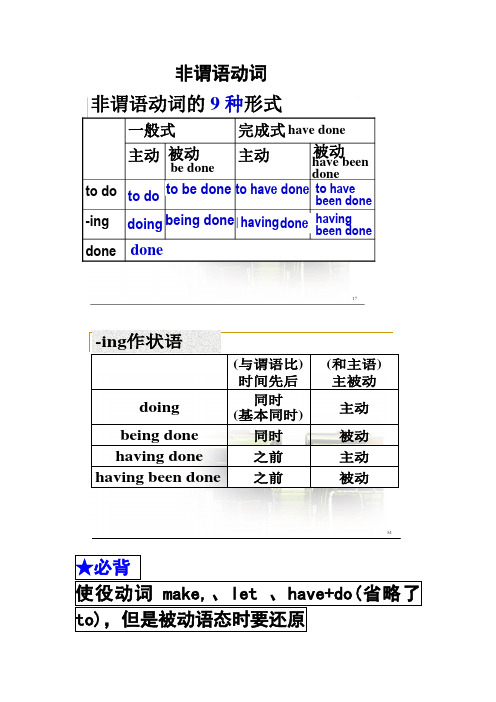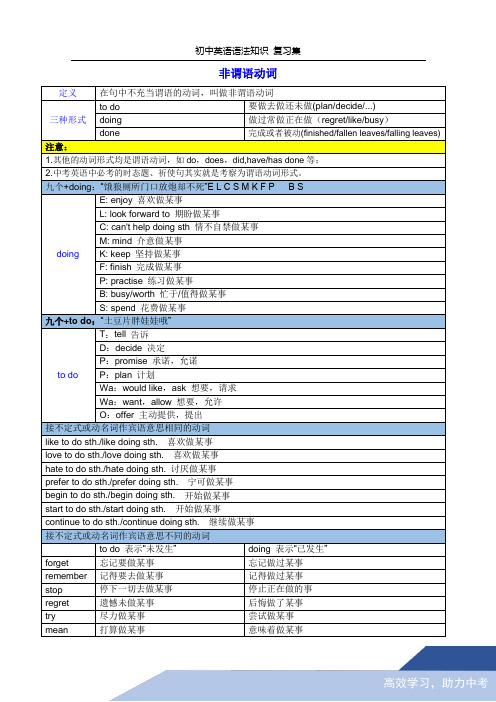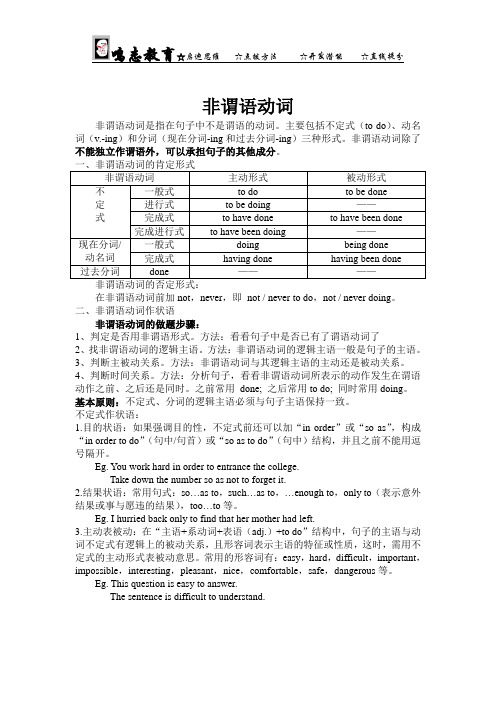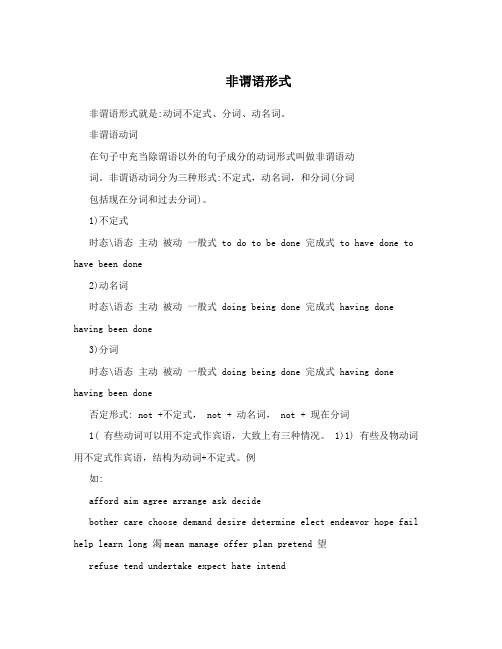非谓语动词9种形式
9.-非谓语动词(动词-ing形式和动词-ed-形式)

be addicted to…
沉迷于……
be absorbed in…
全神贯注于……
be aimed at…
旨在/意图……
be armed with…
有……装备
be buried in…
埋葬在……
be based on/upon… be burdened with… be crowded with… be covered with/by… be coated with… be combined with…
8. 固定句型 (1)There is no use/good/sense/harm+doing sth. 做某事没用 (不好/没意义/没有害处) (2)have difficulty/trouble/problems/a hard time/a good time/ fun + (in)+doing (3)spend/waste/lose time (in) doing sth. (4)There is no... + doing sth. (there is no 表“不可能”)
8. get, become, look, seem, appear, remain等系动词后都可跟
done, 表示被动或主语的状态,如remain seated/hidden, get
paid/dressed/changed/stuck/hurt/injured/ burnt等。
注:常用be done+介词短语表示所处的状态,如下:
3.作定语 This is her father’s walking stick.
4.作宾语 When he came in, we all stopped talking.
注意: mind, miss, excuse, enjoy, escape consider, admit(承认),
常用非谓语用法大总结

非谓语用法总结一、非谓语动词的含义非谓语动词首先是一种动词形式,其次是这种动词形式不能做谓语,综合这两点,我们将其叫做非谓语动词。
二、非谓语动词的形式非谓语动词包含四种形式,即不定式、动名词、现在分词和过去分词。
其中,每种形式按照发生时间和主被动又包括不同的子形式。
具体如下:1.不定式(1)基本形式:to do 表示主动,并且一般表示将来(2)被动式:to be done 表示被动,并且一般表示将来(3)进行式:to be doing 表示主动和进行(4)完成时:to have done 表示主动和完成(5)完成被动式:to have been done 表示被动和完成(6)完成进行式:to have been doing 表示主动和完成进行2。
动名词(1)基本形式:doing 表示主动(2)被动式:being done 表示被动(3)完成式:having done 表示主动和完成(4)完成被动式:having been done 表示被动和完成3.现在分词(1)基本形式:doing 表示主动和进行(2)被动式:being done 表示被动和进行(3)完成式:having done 表示主动和完成(4)完成被动式:having been done 表示被动和完成4.过去分词(1)done,及物动词的过去分词表示被动或完成;(2)不及物动词的过去分词表示主动或完成三、专题要点非谓语动词和独立主格结构主要用法如下:1。
动名词和动词不定式作主语、宾语;2。
只跟动名词作宾语的动词或动词短语;3.只跟动词不定式作宾语的常见动词;4.既可以跟动名词又可以跟动词不定式作宾语,且意义不同的动词或短语;5。
不定式、现在分词、过去分词作宾语补足语的区别;6。
不定式、现在分词、过去分词作定语时的区别;7。
不定式、现在分词、过去分词作状语时的区别;8。
动名词的复合结构在句中作状语;9.there be 结构的两种非谓语形式;10.独立主格结构在句中作状语;11。
动词非谓语形式

动词非谓语形式:一.动词不定式(to):want/would like/need/try to do sth.wish/ hope /begin/ start/ refuseforget/ remember /decide / plan二.动名词(doing):finish/enjoy/be busy doing sth./what about/be good at/go on doing/thank you for spend …(in) doing / be interested in / talk about / What’s another way of saying …?feel like doing / stop …(from) doinginstead of doing动名词短语做主语(你能举个例子吗?)三.后跟动词原形(不加to)的动词:why not do sthhad better (not) do sthmake sb (not)do sthlet sb do sthWill/ Would you please (not) do sth?See/ hear/ watch sb do sth四.现在分词和过去分词find sb doing sthhear/see/watch sb doing sthBeethoven worked all night writing down this piece of music.A place called Gum Tree/ a girl called MaryA boy named TomHe heard the sound of children playing in the park.Hurry up! There is little time left.被动语态:It’s written by Bill Gates.A man was killed yesterday.His house was robbed last night.Some of them are are called humans.Do you like reading books written by Lu Xun?五.其它句型:1.have fun doing/have problems doing sth.2.see/watch/hear sb do/doing sth3.My job is to + 动词原形4.find/feel/think it + 形容词(for sb.)+ to do sth.5.It’s + 形容词(for sb) + to do sth.6.It takes sb some time to do sth.7.spend …(in) doing sth.8.too + 形容词(for sb) to do sth9.be + 形容词/副词+ enough to do sth10.疑问词+ 不定式(to do)11.It seems to be + 形容词12.I’m sorry to hear that.13.He is very happy to see his wife.14.I have a lot of homework to do .15.The best time to visit China is spring.16.He came to say goodbye to us.17.start/begin to do/doing sth.18.There is no time to do sth.19.tell/ask sb (not)to do sth.20.can/can’t afford to do sth.21.try/ do one’s best to do sth22.It’s one’s turn to do sth.23.take turns to do sth24.I’m sorry to trouble you.25.be the first to do sth.26.be glad/happy / pleased to do sth.27.happen to do sth.28.It’s nice/kind of you to do sth.29.something to eat /drink30.telephone sb to complain about sth.31.stop to do sth/ stop doing sth32.go on doing sth/ go on to do sth33.get ready to do sth34.go / come /run / hurry off to do sth35.teach sb to do sth.36.They improved the software to make it easier for people to use computers. 练习1.__________you ___________(finish) ___________(pack) your bag half an hourago?2.There ___________(be) an English party next Sunday. Would you like ___________(come)?3.I watched the children ___________(play) football on the playground yesterday.4.All children enjoy ___________(play) computer games.5.His mother is ill. I’m sorry ___________(hear) that.6.My job is ___________(teach) them Chinese.7.___________(watch) TV too much is bad for your eyes.8.Would you like something _________(eat)?9.Who ______________(teach) you English last year? Miss Wang.10.It ______________(rain) hard outside. Y ou’d better ______________(take) anumbrella.11.She has a lot of homework ______________(do) tonight.12.Y ou’d better ______________(not laugh) at us.13.She ___________(find) a job in Y antai, didn’t she?14.She fell down and ______________(break) her leg.15.The radio says the clouds ______________(lift) quickly.16.She came here ______________(say) goodbye to me.17.I found it very hard ______________(climb) the mountain.18.I have an American friend ______________(call) David.19.Is ______________(go) to bed too late bad for your health?20.______________we ______________(play) football this Sunday? OK.21.______________they ______________(have) supper at six yesterday?22.______________(not play) with snow in the street.23.The best time ______________(come) to China is spring.24.Listen! We can hear the girls ____________(sing) in the classroom.25.I keep a diary to help me __________(remember) things.26.Who __________(come) to visit China last month?27.Why __________she __________(not come) to school last week? Because she__________(be) ill in bed.28.He with his parents ______________(go) swimming every day.29.She doesn’t know when ____________(start).30.Try ____________(not be) late again.31.It’s very useful for us ____________(learn) a foreign language.32.The twins planned ____________(go) hiking next Sunday.33.Could I trouble you ____________(pass) me the tea?34.It took him a long time ____________(get) to the top of the mountain.35.Will you please ____________(not take) off your shoes?36.Can you make the kite ___________(fly) high?37.A policeman saw it ____________(happen), he took him to the hospital.38.He liked to play jokes ____________(make) his friends ____________(laugh).39.The boss made the workers _____________(work) over twelve hours a day.40.My father, with my mother is interested in _____________(watch) TV plays.41.Why not ______________(go) the park with me tomorrow?42.The teacher told us ____________(not play) too much computer games.43.His parents stopped him from _______________(play) computer games.44.The writer spent two years ____________(write) a novel.45.We are tired. Let’s stop ______________(have) a rest.46.When she saw me in the street yesterday, she stopped _____________(talk) to me.47.Stop ______________(read) and begin to write the new words. 48.After lunch, we went on ______________(do) our homework.49.She came here ______________(say) goodbye to me.50.After we read the text, we went on _______________(write) the new words.51.His father kept him _______________(stand) in the room for half an hour.52.She was very tired. She didn’t feel like ______________(talk).53.She decided ______________(not go) there the next day.54.The girl found a wallet ______________(lie) on the ground when she passed thegate.55.Do you have fun ______________(play) chess?56.We had some problems ______________(climb) the mountain.57.The ship arrived too late ______________(save) more lives.58.The boy is tall enough ______________(reach) the apples.59.We have no time ______________(do ) our homework.60.It’s our turn ______________(clean) the blackboard.61.I happened ______________(see) an old friend of mine when I was walking in thestreet last week.62.He ran ______________(help) us at once.63.We can afford ______________(buy ) a new computer now.64.There was no time ______________(open) it.65.She spent two hours _____________(wash) the clothes last week.。
非谓语动词的 9 种形式

非谓语动词 17done -ing to do 被动主动被动主动完成式一般式to do doing doneto be done being done to have done have done to have been donehaving been done having be done have done have been done51被动之前having been done主动之前having done 被动同时being done 主动同时(基本同时)doing (和主语)主被动(与谓语比)时间先后-ing 作状语★必背使役动词make,、let 、have+do(省略了感官动词see/ watch/hear/feel1: +do(一般现在和一般过去,不强调正在进行都可用)I saw the boys fight with each other yesterday.PS: 被动态时需要还原“to ”The boys were seen to fight with each other yesterday.2: +doing (强调正在进行)The girl reported seeing a beautiful bird flying toward the window. 14非谓语动词题目三步走:⏹是否已存在另一个动作(不管前面还是后面)⏹主被动关系⏹时间先后顺序◆习题 ◆⏹S he reached the top of the hill andstopped on a big rock to see the rising sun.A. to have restedB. restingC. to restD. rest⏹Y ou were brave enough to raiseobjections at the meeting.Well, now I regret _ that.A. to doB. to be doingC. to have doneD. having done⏹T hey knew her very well. They hadseen her _ up from childhood.A. growB. grewC. was growingD. to grow⏹I’ve heard him _ about you often.A. talkedB. talksC. talkD. to talk⏹I f you think that treating a womanwell means always _ her permission for things,think again. (06湖南) A. gets B. got C. to get D. getting⏹H e walked down the hills, _ softly tohimself。
非谓语动词讲解(超全)

非谓语动词非谓语动词: a.动词不定式 b.动名词 c.分词( 现在分词过去分词)概述:1.谓语动词:在句子中担任谓语的动词2.非谓语动词:是动词的特殊形式,在句中可以作除谓语外的所有成分指出下列句子中非谓语动词的成分1,To see is to believe. 2, It is right to give up smoking.3, He wanted to go 4, I find it interesting to study English.5, He asked me to do the work with him. 6, I have some books for you to read.7, I came here to see you. 8, We were very excited to hear the news.9,Laying eggs is the ant queen’s full-time job. 10, It is no use arguing with him.11, Her job is teaching . 12.He had his clothes washed.13,We saw the teacher making the experiment. 14,The man standing by the window is our teacher.15,The excited people rushed into the building. 16,Being a student, I must study hard.17,The teacher stood there, surrounded by the students. 18,The news is inspiring.非谓语动词使用条件一个句子当中,已经存在一个主句(谓语动词),又没有连词的情况下, 还有别的动词出现时。
初中英语语法知识复习集之非谓语动词

非谓语动词定义在句中不充当谓语的动词,叫做非谓语动词三种形式to do 要做去做还未做(plan/decide/...)doing 做过常做正在做(regret/like/busy)done 完成或者被动(finished/fallen leaves/falling leaves)注意:1.其他的动词形式均是谓语动词,如do,does,did,have/has done等;2.中考英语中必考的时态题、祈使句其实就是考察为谓语动词形式。
九个+doing:“饿狼厕所门口放炮却不死”E L C S M K F P B Sdoing E: enjoy 喜欢做某事L: look forward to 期盼做某事C: can't help doing sth 情不自禁做某事M: mind 介意做某事K: keep 坚持做某事F: finish 完成做某事P: practise 练习做某事B: busy/worth 忙于/值得做某事S: spend 花费做某事九个+to do:“土豆片胖娃娃哦”to do T:tell 告诉D:decide 决定P:promise 承诺,允诺P:plan 计划Wa:would like,ask 想要,请求Wa:want,allow 想要,允许O:offer 主动提供,提出接不定式或动名词作宾语意思相同的动词like to do sth./like doing sth. 喜欢做某事love to do sth./love doing sth. 喜欢做某事hate to do sth./hate doing sth. 讨厌做某事prefer to do sth./prefer doing sth. 宁可做某事begin to do sth./begin doing sth. 开始做某事start to do sth./start doing sth. 开始做某事continue to do sth./continue doing sth. 继续做某事接不定式或动名词作宾语意思不同的动词to do 表示“未发生”doing 表示“已发生”forget 忘记要做某事忘记做过某事remember 记得要去做某事记得做过某事stop 停下一切去做某事停止正在做的事regret 遗憾未做某事后悔做了某事try 尽力做某事尝试做某事mean 打算做某事意味着做某事can't help 不能帮助做某事情不自禁做某事go on 做完某事后接着做另一件事继续做同一件事动词不定式省略to的三种情况1.使役动词使/让某人做某事使/让某人....make make sb do sth make sb+ adjlet let sb do sth let sb +adj2.感官实义动词doing 表示“正发生;反复的动作”do表示“经常发生;动作全过程”see 看见某人正在做某事看见某人经常做某事/全过程watch 看见某人正在做某事看见某人经常做某事/全过程hear 听见某人正在做某事听见某人经常做某事/全过程notice 注意到某人正在做某事听见某人经常做某事/全过程3.had better(not)do sth最好做某事/would rather(not)do sth宁愿做某事4.help to (do) sth注意:在用于被动语态时,to要还原She is made to our monitor.动词不定式to do 的用法①作主语It’s nice to hear from you.②作宾语I forgot to lock the door.③作宾补He ordered her to leave at once.④作表语My job is to pick up letters.⑤作定语He is always the first one to get there.⑥作状语常常翻译成“为了...”。
英语语法:非谓语动词

非谓语动词非谓语动词是指在句子中不是谓语的动词。
主要包括不定式(to do)、动名词(v.-ing)和分词(现在分词-ing和过去分词-ing)三种形式。
非谓语动词除了不能独立作谓语外,可以承担句子的其他成分。
在非谓语动词前加not,never,即not / never to do,not / never doing。
二、非谓语动词作状语非谓语动词的做题步骤:1、判定是否用非谓语形式。
方法:看看句子中是否已有了谓语动词了2、找非谓语动词的逻辑主语。
方法:非谓语动词的逻辑主语一般是句子的主语。
3、判断主被动关系。
方法:非谓语动词与其逻辑主语的主动还是被动关系。
4、判断时间关系。
方法:分析句子,看看非谓语动词所表示的动作发生在谓语动作之前、之后还是同时。
之前常用done; 之后常用to do; 同时常用doing。
基本原则:不定式、分词的逻辑主语必须与句子主语保持一致。
不定式作状语:1.目的状语:如果强调目的性,不定式前还可以加“in order”或“so as”,构成“in order to do”(句中/句首)或“so as to do”(句中)结构,并且之前不能用逗号隔开。
Eg. You work hard in order to entrance the college.Take down the number so as not to forget it.2.结果状语:常用句式:so…as to,such…as to,…enough to,only to(表示意外结果或事与愿违的结果),too…to等。
Eg. I hurried back only to find that her mother had left.3.主动表被动:在“主语+系动词+表语(adj.)+to do”结构中,句子的主语与动词不定式有逻辑上的被动关系,且形容词表示主语的特征或性质,这时,需用不定式的主动形式表被动意思。
非谓语形式

非谓语形式非谓语形式就是:动词不定式、分词、动名词。
非谓语动词在句子中充当除谓语以外的句子成分的动词形式叫做非谓语动词。
非谓语动词分为三种形式:不定式,动名词,和分词(分词包括现在分词和过去分词)。
1)不定式时态\语态主动被动一般式 to do to be done 完成式 to have done to have been done2)动名词时态\语态主动被动一般式 doing being done 完成式 having done having been done3)分词时态\语态主动被动一般式 doing being done 完成式 having done having been done否定形式: not +不定式, not + 动名词, not + 现在分词1( 有些动词可以用不定式作宾语,大致上有三种情况。
1)1) 有些及物动词用不定式作宾语,结构为动词+不定式。
例如:afford aim agree arrange ask decidebother care choose demand desire determine elect endeavor hope fail help learn long 渴mean manage offer plan pretend 望refuse tend undertake expect hate intend例如:The driver failed to see the other car in time. 司机没能及时看见另一辆车。
He offered to help me. 他表示愿意帮助我。
2)有些动词除了可以用不定式作宾语,还用不定式作补语,即有动词+宾语+不定式的结构。
例如:ask choose expect help beg intend like/love need prefer prepare want wish例如:I like to keep everything tidy. 我喜欢每件东西都保持整洁。
- 1、下载文档前请自行甄别文档内容的完整性,平台不提供额外的编辑、内容补充、找答案等附加服务。
- 2、"仅部分预览"的文档,不可在线预览部分如存在完整性等问题,可反馈申请退款(可完整预览的文档不适用该条件!)。
- 3、如文档侵犯您的权益,请联系客服反馈,我们会尽快为您处理(人工客服工作时间:9:00-18:30)。
非谓语动词9种形式
1.不定式:to+动词原形,表示目的、原因、结果等。
2. 现在分词:动词+ing,表示主动、进行或描述。
3. 过去分词:动词+ed,表示被动、完成或描述。
4. 动名词:动词+ing,作主语、宾语或介词后的宾语。
5. 分词短语:现在分词或过去分词+其他成分,作状语或定语。
6. 带to的分词短语:to+过去分词,表示被动或完成,作状语或定语。
7. 带having的分词短语:having+过去分词,表示完成,作状语或定语。
8. 带不定式的分词短语:动词+不定式,表示目的、结果、方式,作状语或定语。
9. 带介词的分词短语:动词+介词+现在分词或过去分词,作状语或定语。
- 1 -。
